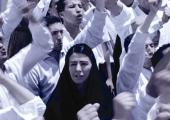theartsdesk in Los Angeles: Twilight in Tent City

The movie capital needs to get its act together for next year's festival
The Los Angeles Film Festival would seem to have everything going for it. There's the perfect Californian weather, the vast number of stars who live and work in the city, and this year there’s been a glamorous new venue in downtown Los Angeles. The 16th festival has also brought in an ambitious new artistic director, former Newsweek film critic David Ansen, who hopes to unite high and low, screening both crowd-pleasers with major Hollywood talent and small, finely crafted foreign films. And yet something has been amiss.





